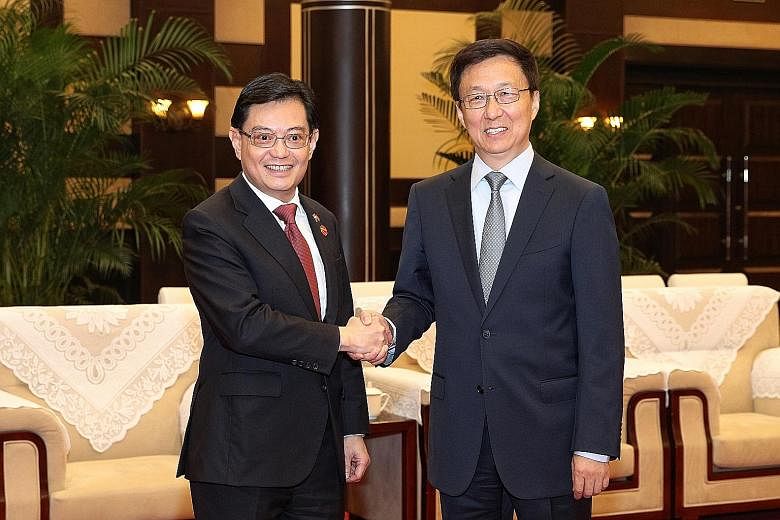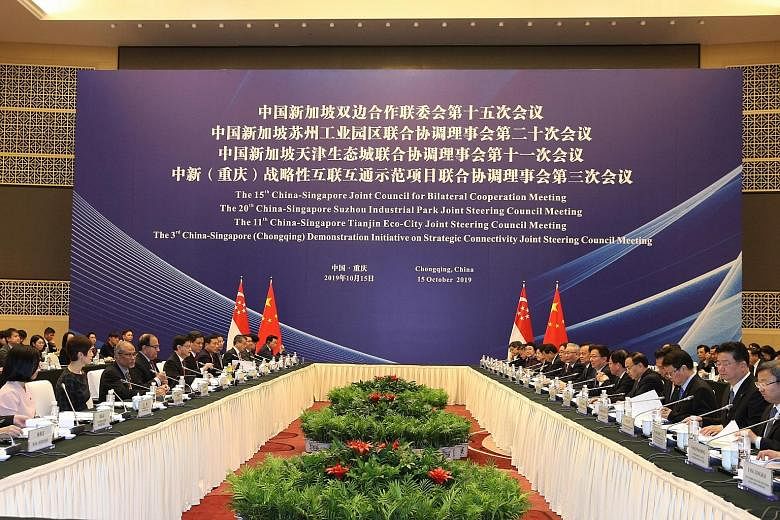Singapore's fourth-generation leadership has a comprehensive plan for engaging with China economically and plugging into the East Asian giant's rapid development.
Ten members of the 4G cohort drove home the point yesterday as they spoke to Singapore media at the end of a bilateral meeting in Chongqing that was of particular significance as the Singapore team was composed completely of this new generation of political leaders.
The delegation was led by Deputy Prime Minister Heng Swee Keat, who co-chaired the 15th Joint Council for Bilateral Cooperation, the highest-level platform for discussions between Singapore and China.
Mr Heng, who took over the reins from former deputy prime minister Teo Chee Hean earlier this year, said his first meeting in the new role was forward-looking and productive.
He also took the opportunity to "understand China's development priorities and direction in the coming years, and to look at how we can build on these priorities", he added.
As Singapore transitions to a new political team and marks three decades of diplomatic relations with China next year, the vision of the 4G crew is to build on the foundation of the past decades and "scale new peaks" in ties with China, he said.
An emerging area of collaboration is smart cities, which address today's trends of rapid urbanisation and digitalisation, said Minister for Communications and Information S. Iswaran.
The two sides yesterday signed an agreement on a smart cities initiative in Shenzhen that would, among other things, help promote talent flow in both directions.
Another area is the environment, with both sides "at the forefront" and joining forces to fight climate change on the world stage, said Minister for the Environment and Water Resources Masagos Zulkifli.
The two nations are also applying technology to achieve zero-waste cities at Tianjin Eco-city, Singapore's second flagship project with China, added Mr Masagos.
The frequent visits to China by Singapore ministers and officials show the relationship "is not static and monolithic", noted Trade and Industry Minister Chan Chun Sing.
These also show they are keen to keep pace with China's developments and understand the different priorities of various provinces as well as the central government.
Mr Chan outlined three priority areas Singapore will focus on in its partnership with China: Internationalisation of the Chinese economy, plugging into the mainland's regional development strategies, and non-physical aspects of the new economy, such as professional services and data flows.
"All these are intangibles, but they all play a part in the new economy, and this is also what the Chinese are focused on," he said.
The Guangzhou-Hong Kong-Macau Greater Bay Area economic blueprint is of particular interest, as the ministers spoke about plugging into the masterplan with such existing projects as the Guangzhou Knowledge City and the new smart city agreement for technology capital Shenzhen.
The continued emphasis on ensuring that cooperation is updated to match China's priorities has served the partnership well.
Manpower Minister Josephine Teo noted that the Chongqing Connectivity Initiative, the third flagship bilateral project, has been elevated to a strategic national-level project and given high priority, as it catalyses the development of China's western region and links up the Belt and Road routes, while fulfilling broader economic integration between China and South-east Asia.
Mr Heng said another important area of cooperation is capital market connectivity, and the development of a more resilient financial system able to channel capital to productive uses across the different areas.
He recounted a Chinese official noting on Monday that Singapore was unique in that it has many cooperation platforms with China.
"The phrase he used was duyi wuer (unique and unmatched)," Mr Heng added. "This is something that both sides value, and we would like to take this forward."


